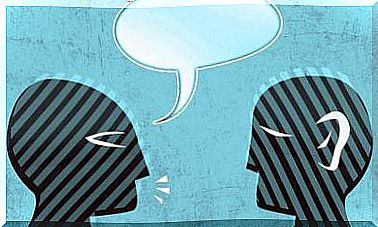Why Do We Sometimes Feel Dizzy?

Milan Kundera says that “vertigo is more than the fear of falling. It is the voice of the void below us that attracts and captivates us, the desire to fall from which we then defend ourselves with fear. “
Opening this text with a quote from Milan Kundera on vertigo may seem daring. However, we mean “vertigo” in its psychological sense; although it is a physiological disorder, it can have serious consequences on our psyche. And it is under this psychological spotlight that you can continue reading.
“For pity take me, where the vertigo will tear my memory and reason … For pity!” I’m afraid to be left alone, alone with my pain! “
-Gustavo Adolfo Bécquer-
What is vertigo?
Vertigo is a disorder that causes us to feel moved or dizzy. Many describe it as dizziness, but it is not in itself a sense of confusion. People who suffer from this disease really feel that the world is moving around them.

The causes are varied. In the case of peripheral vertigo, with the problem which is in the inner ear, the disorder can be motivated by nerve inflammations, lesions with head trauma, ingestion of drugs, etc. On the other hand, if one suffers from central type vertigo, the problem of which is in the brain, the reasons may be strokes, drugs, vascular disease or tumors.
Regardless of which one is suffering from, both have similar symptoms. We often find dizzy spells, hearing loss, ringing in the ear, double vision, facial paralysis … Other problems would be poor language articulation, weakness or problems in eye movements.
Psychological factors of vertigo
Vertigo causes another set of problems in the individual, beyond the purely physiological aspect. On a psychological level, anyone can be affected. This is what doctors such as MR Clark, L. McKenna, M. Dieterich or RG Jacob believe, on whose studies we have based ourselves in order to make this list of possible consequences.
Psychogenic vertigo
Insecurity, anxiety, and depression are symptoms of psychogenic dizziness. These dizziness can cause or be caused by these situations. However, although they are not a primary part of this disorder, they can be associated, although studies on this subject are not yet conclusive.
Panic
It is not always easy to tell the difference between panic and vertigo. While a panic attack can be caused by different social or personal situations, there are also cases where it is linked to vertigo-related disorders.
In this case, one feels dizzy, a feeling of weakness and anxiety. This can be associated with problems breathing, palpitations, and excessive sweating. Very often it has been thought that this could be a transient situation when in reality the patient is suffering from dizziness.
Anxiety
Anxiety, both chronic and acute, can become part of the vertigo disorder. In this sense, making important decisions while suffering from this disease can greatly complicate the symptoms.
Somatization
In this case, we are not talking about a psychological problem generated by the vertigo but about a syndrome of somatization. That is to say, different symptoms of the disease can be found in the patient. However, this one somatized it but did not suffer from it in reality. Despite everything, he suffers from dizzy spells, migraines, fatigue, etc.
Depression
Any chronic illness can lead to depression. In this case, vertigo is part of this disastrous family. So, dizziness and other symptoms could be proof that there is a major problem behind vertigo.

Phobic postural vertigo
Another vertigo disorder can be phobic postural vertigo. He received this designation from Dr. Brandt, who demonstrated that this disorder can lead to fears of falling on the part of patients while they are standing, walking or doing any task.
Episodes of this problem can appear spontaneously. They could also cause avoidance attitudes that lead to fears, agoraphobia, hypochondria, and other psychological symptoms.
“I felt a feeling of dizziness, like I was just rushing from one world to another and like arriving in each of them soon after the end of the world happened. “
-Italo Calvino-
We can therefore observe that vertigo is much more than a simple disease. Without the proper psychological preparation, it will not only affect our movement but also our brain. Despite everything, with a positive attitude, we will be able to overcome the mental disorders that it could cause in concrete cases.









